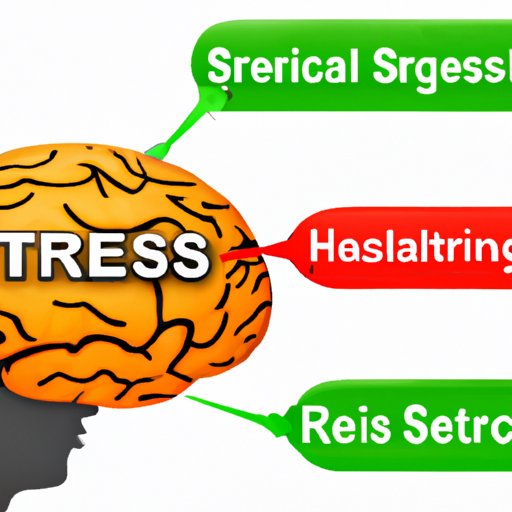
I. Introduction
The human body is a complex system capable of various functions, including digestion and the management of stress. Recent studies have shown that there is a strong link between stress and digestion. This phenomenon, known as the gut-brain connection, has highlighted the importance of taking care of your digestive system, especially during times of stress and anxiety.
II. The Gut-Wrenching Connection: How Stress Affects Your Digestion
The nervous system is responsible for managing various functions in the body, including digestion. The enteric nervous system regulates digestion and works independently from the rest of the nervous system. Stress can activate the enteric nervous system, ultimately affecting the digestive system and causing symptoms such as nausea, bloating, and stomach pains.
III. Stomach Troubles: Can Stress Really Cause Indigestion and Acid Reflux?
Indigestion is a common problem that happens when your body is unable to digest food properly. When stress impacts the enteric nervous system, it can cause indigestion and acid reflux by interfering with the production of digestive enzymes and bile. Real-life examples, such as public speaking anxiety, demonstrate the link between stress and digestive issues.
IV. When Your Mind Hurts Your Stomach: How Stress and Anxiety Contribute to Digestive Issues
Anxiety is a common feeling associated with stress and can have various effects on our bodies. Anxiety initiates a “fight or flight” response causing the body to divert resources away from the digestive system. This impacts the body’s ability to properly digest food and absorb nutrients, leading to digestive issues such as bloating, constipation, and diarrhea. This link is supported by scientific studies, highlighting the close relationship between stress, anxiety, and the digestive system.
V. Indigestion, Stress, and the Brain-Gut Connection: What Science Tells Us
Studies have demonstrated how the brain-gut connection explains the link between stress and digestion. Communication between the brain and gut is facilitated by hormones and neurotransmitters responsible for regulating digestion. This connection can affect infection and inflammation in the gut. The findings suggest that stress management practices could help relieve digestive issues.
VI. Does Stress Affect Your Digestive System? The Surprising Link Between Mental and Gut Health
The gut microbiome is a complex system of microorganisms that play an important role in digestion. Stress is said to cause disturbances in the gut microbiome by promoting the growth of “bad” bacteria and impairing the growth of “good” bacteria. Probiotics have been proven to be an effective tool in promoting healthy gut bacteria and regulating digestive function.
VII. The Emotional Toll on Your Digestion: How to Reduce Stress and Improve Your Gut Health
Various stress management techniques can help improve digestion, including exercise, yoga, and meditation. Dietary changes can also promote healthy digestion, such as eating small portions throughout the day, drinking plenty of water, and avoiding greasy and spicy foods. Other holistic approaches that can improve gut health include massage therapy and acupuncture.
VIII. Conclusion
Stress has a profound impact on digestion, and understanding this connection is essential for taking care of your overall health. By using a combination of stress management techniques and adopting a healthy lifestyle, you can improve the symptoms of digestive issues and reduce stress. Remember, it is important to seek help from a healthcare professional if you experience severe and persistent digestive symptoms.





